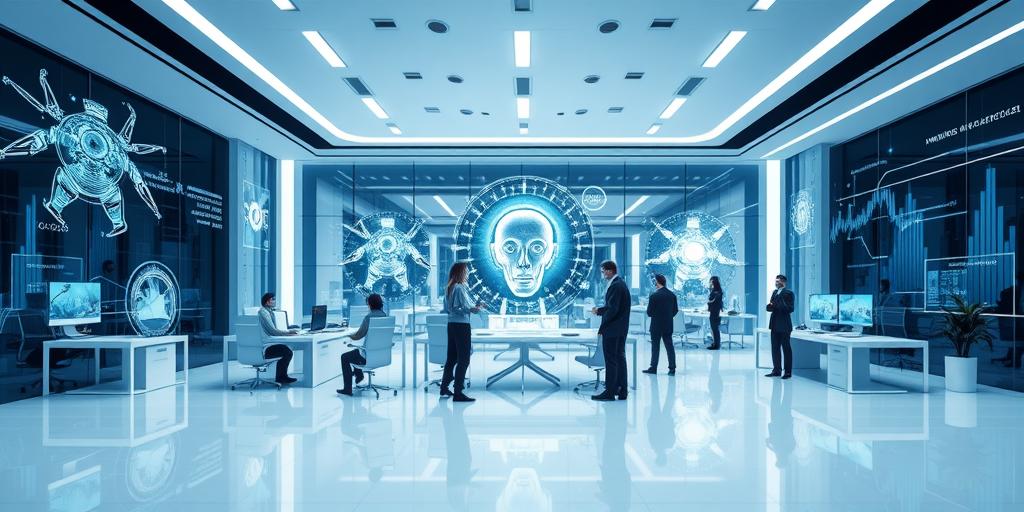Emerging Tech Shaping the Future of Work
The modern workplace is in a state of constant evolution, driven by rapid advancements in technology. Emerging technologies are not just tools for increased efficiency; they are fundamentally reshaping how we work, collaborate, and even think about our careers. This post explores some of the key emerging technologies that are poised to revolutionize the future of work.
Artificial Intelligence (AI) and Automation
AI and automation are arguably the most transformative technologies impacting the workplace. From automating repetitive tasks to providing sophisticated data analysis, AI is enhancing productivity and enabling employees to focus on more strategic and creative endeavors.
- Automation of Routine Tasks: AI-powered robots and software can handle mundane, repetitive tasks, freeing up human employees for higher-value activities.
- Enhanced Decision-Making: AI algorithms can analyze vast datasets to provide insights and recommendations, improving the quality and speed of decision-making.
- Personalized Learning and Development: AI can tailor training programs to individual employee needs, accelerating skill development and improving job satisfaction.
Internet of Things (IoT)
The Internet of Things (IoT) is connecting devices and systems to create smarter, more efficient work environments. IoT devices can monitor and optimize various aspects of the workplace, from energy consumption to employee safety.
- Smart Offices: IoT sensors can adjust lighting, temperature, and ventilation based on occupancy, reducing energy waste and creating a more comfortable work environment.
- Predictive Maintenance: IoT devices can monitor equipment performance and predict potential failures, enabling proactive maintenance and minimizing downtime.
- Improved Safety: Wearable IoT devices can track employee location and vital signs, improving safety in hazardous work environments.
Augmented Reality (AR) and Virtual Reality (VR)
Augmented Reality (AR) and Virtual Reality (VR) are creating immersive experiences that are transforming training, collaboration, and customer engagement. These technologies can simulate real-world scenarios, providing employees with hands-on training and enabling remote collaboration.
- Immersive Training: VR simulations can provide realistic training scenarios for complex tasks, such as surgery or equipment repair, without the risk of real-world consequences.
- Remote Collaboration: AR and VR can enable remote teams to collaborate in a shared virtual space, improving communication and productivity.
- Enhanced Customer Experiences: AR applications can provide customers with interactive product demonstrations and virtual tours, enhancing engagement and driving sales.
Blockchain
Blockchain technology is providing secure and transparent solutions for various workplace challenges, such as identity management, supply chain tracking, and contract management.
- Secure Identity Management: Blockchain can provide a secure and tamper-proof system for verifying employee identities and credentials.
- Transparent Supply Chain Tracking: Blockchain can track the movement of goods and materials throughout the supply chain, improving transparency and accountability.
- Smart Contracts: Blockchain-based smart contracts can automate the execution of agreements, reducing the risk of disputes and improving efficiency.
5G Technology
The rollout of 5G technology is enabling faster and more reliable wireless communication, which is critical for supporting the growing number of connected devices and bandwidth-intensive applications in the workplace.
- Improved Connectivity: 5G provides faster and more reliable wireless connectivity, enabling seamless access to cloud-based applications and services.
- Enhanced Mobile Collaboration: 5G supports high-quality video conferencing and collaboration tools, enabling remote teams to work together more effectively.
- New Business Models: 5G is enabling new business models, such as remote monitoring and control of industrial equipment.
The Future of Work
These emerging technologies are not just changing the way we work; they are also creating new opportunities and challenges. As technology continues to evolve, it is essential for businesses and employees to adapt and embrace these changes in order to thrive in the future of work. By understanding and leveraging these technologies, organizations can create more efficient, productive, and engaging work environments.
Long-tail keywords:
- How AI is changing work
- IoT in the workplace
- AR and VR applications for business
- Blockchain for business solutions
- 5G effects on remote work









